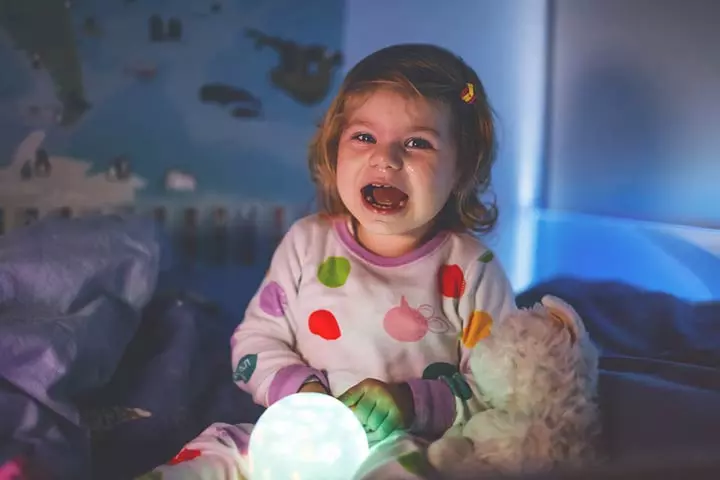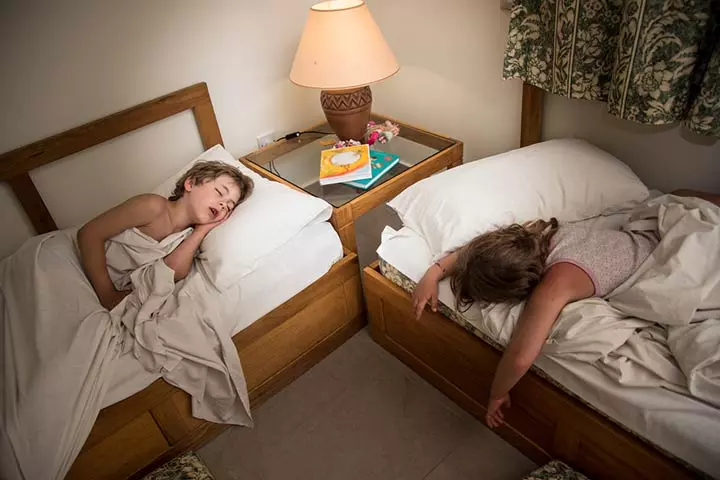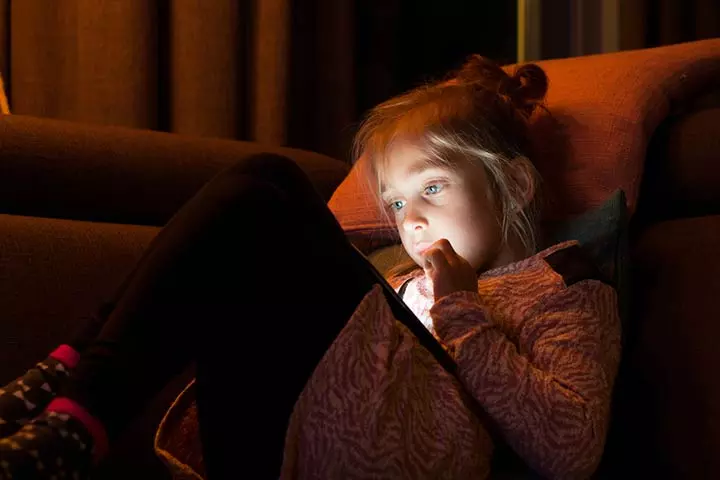
Image: Shutterstock
If there’s one thing that parents collectively agree on after the birth of their child, it is that they’ve lost their sleep! Parents have to deal with all sorts of sleep shenanigans from their toddlers. For some, putting their little ones to sleep in the first place is a challenge. For others, the problem is kids not staying asleep. Some have to deal with kids waking up in the middle of the night while others might have to deal with them waking too early in the morning. And of course, there are the really unlucky ones who have to deal with it all!
Sleep is a habitual thing and before trying to fix it you will have to identify the exact reasons behind your kid’s irregular sleeping patterns. Let us look at these reasons contributing to your baby’s nighttime struggles and what can be done to deal with them!
Reasons Why Your Toddler Isn’t Sleeping At Night Or Wakes Up Too Early
Before we figure out what can be done to help your little one sleep better, let’s look at why it’s probably happening in the first place:
1. They’re Too Dependent On You

Image: Shutterstock
As kids transition from the infant to toddler stages, some habits from the earlier stages tend to stick with them. Being by their parent’s side all the time is such a dependency. Even when they’re sleepy, they would refuse to fall asleep without your presence. Some also demand being carried in their parent’s arms or being rocked to sleep. Those parents relying on these tactics in making their kids go to sleep must know that such dependencies will only cause more issues in the long run. Parents should instead try to teach their toddlers to be self-reliant and slowly move away from their infant habits.
2. They Sleep Too Much During The Day

Image: Shutterstock
Although naps are essential for your toddler, make sure they are not oversleeping in the afternoon or sleeping close to bedtime, as this can hamper sleep quality at night. Even letting your kid sleep till late in the morning can cause failure to sleep during the night. One nap is enough for most toddlers, while babies may need two or three (1).
3. They Have Separation Anxiety

Image: Shutterstock
As babies spend most of their time being in their parent’s arms or playing around them, it gets difficult for them to part ways when it is time. Kids feel a sense of security with you around, and when you leave them alone to sleep, fear takes over. The thought of being alone all night makes them throw tantrums, cling to their parents, and sometimes cry inconsolably. It’s called separation anxiety (2). The fear is genuine but can be resolved with a gradual change of habits.
4. There Is No Bedtime Routine

Image: Shutterstock
Lack of a bedtime routine is the primary cause of many sleep problems among toddlers. When you do the same things each night, your child realizes when to doze off. Not following the same time to sleep or not getting a sleep-friendly environment every night can create insomnia and sleep regression (3).
5. They Snore Or Have Other Breathing Problems

Image: Shutterstock
Regular snoring is a sign of disturbed sleep. It is also connected with Obstructive Sleep Apnea. Apnea happens when oxygen levels drop due to airflow obstruction. This causes several lapses in breath during nighttime. Obstructive Sleep Apnea can cause fragmented sleep. Snoring and apnea can occur because of multiple factors such as enlarged tonsils, asthma, allergies, and congestion. Check with your doctor if you notice any breathing problems or snoring in your child (4).
6. Sensitivity To Light

Image: Shutterstock
Research indicates that light exposure during bedtime can confuse a toddler’s body clock. It suppresses the melatonin hormone and discourages sleep. The effect is twice as compared to adults (5).
What Can You Do About It?

Image: Shutterstock
Now that you know what’s probably going on with your child at night or dawn, here’s what you can do to help:
1. Establish A Routine

Image: Shutterstock
Start by creating an excellent night time routine for your little one. Once this is done, be firm about it and make sure your child follows it. Consistency here is critical, as this can help your child make a habit out of it. A regular sleep time routine will set your child’s biological clock to the desired hour.
2. Create A Sleep-friendly Environment

Image: Shutterstock
This includes giving your child a night bath, changing them into comfortable nightwear, tucking them in a warm blanket or comforter, or setting up some relaxing music for a calm environment. Switch off the light and make the room dark at night but make sure it’s well ventilated. Darkness and quietness in the room promote sleep. This will help your toddler prepare and sleep faster.
3. Keep Gadgets Away

Image: Shutterstock
We often forget how important it is to keep gadgets away from children, especially at nighttime. To make them stop crying, we mostly use smartphones as a pacifier! What we don’t know is that the blue light from screens can disturb the hormone melatonin, which is responsible for making people sleep. Impose a gadget curfew at least two hours before bedtime (6).
4. Avoid Dependency

Image: Shutterstock
The inconsolable crying of your little one might push you to alternatives that are too hard to follow in the long term. You should avoid making nighttime habits like putting them to sleep in your lap or letting them sleep in your room. Creating these support systems will be painful for you and as well as for the baby. Instead, teach them to sleep on their own — maybe you could lie down for a bit and then leave. Children may push back in the beginning, but you will have to stay firm.
5. No Caffeine And Sugar Near Bedtime

Image: Shutterstock
Keep a tab on what your kid eats or drinks before bedtime. Their evening meal should not have sugar or caffeine in it as it can make their brain hyperactive. Avoid heavy meals and foods that are processed and high in sugar. Keep the dinner light and healthy instead (7).
It’s essential to be patient with your child. It is a transition, and your child might find it difficult. But just remember, like any habit, sleep habits can also take time to set in. As the parent, you will have to act with patience and not try to rush these habits. With the steps we’ve mentioned, you may be able to see some changes in your child’s sleeping patterns. Do you have any suggestions for us? Let us know in the comments below!
References
- Spotlight On Daytime Napping During Early Childhood
https://www.ncbi.nlm.nih.gov/pmc/articles/PMC5851571/ - Relations Between Parental and Child Separation Anxiety: The Role of Dependency-Oriented Psychological Control
https://www.ncbi.nlm.nih.gov/pmc/articles/PMC4598341/ - Environmental Determinants of Insufficient Sleep and Sleep Disorders: Implications for Population Health
https://www.ncbi.nlm.nih.gov/pmc/articles/PMC6033330/ - Sleep-Disordered Breathing in Children
https://www.ncbi.nlm.nih.gov/pmc/articles/PMC6557418/ - Effects Of Light On Human Circadian Rhythms, Sleep, And Mood
https://www.ncbi.nlm.nih.gov/pmc/articles/PMC6751071/ - Effects Of Blue Light On The Circadian System And Eye Physiology
https://www.ncbi.nlm.nih.gov/pmc/articles/PMC4734149/ - The Relationship Between Caffeine, Sleep, and Behavior in Children
https://www.ncbi.nlm.nih.gov/pmc/articles/PMC5359329/
Community Experiences
Join the conversation and become a part of our nurturing community! Share your stories, experiences, and insights to connect with fellow parents.












